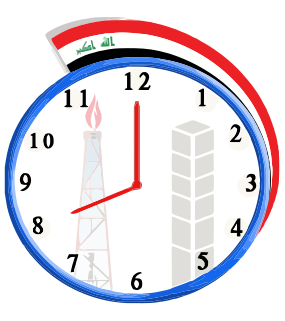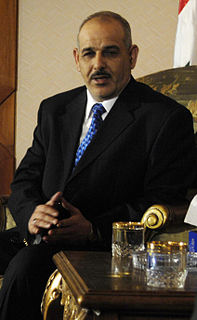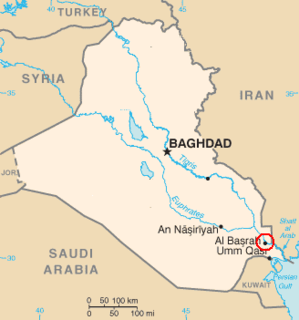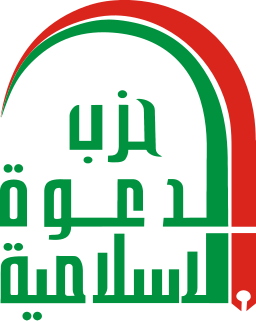The politics of Iraq take place in a framework of a federal parliamentary representative democratic republic. It is a multi-party system whereby the executive power is exercised by the Prime Minister of the Council of Ministers as the head of government, as well as the President of Iraq, and legislative power is vested in the Council of Representatives and the Federation Council.

The National Iraqi Alliance, also known as the Watani List, is an Iraqi electoral coalition that contested the Iraqi legislative election, 2010. The Alliance is mainly composed of Shi'a Islamist parties. The alliance was created by the Supreme Council for Islamic Revolution in Iraq to contest in the January 2005 and December 2005 under the name United Iraqi Alliance, when it included all Iraq's major Shi'a parties. The United Iraqi Alliance won both those of elections however later fell apart after several major parties left the alliance due to disputes with Prime Minister Nouri al-Maliki and the Supreme Council.

Following the ratification of the Constitution of Iraq on 15 October 2005, a general election was held on 15 December to elect a permanent 275-member Iraqi Council of Representatives.
The first government of Iraq led by Nouri al-Maliki took office on May 20, 2006 following approval by the members of the Iraqi National Assembly. This followed the general election in December 2005. The government succeeded the Iraqi Transitional Government which had continued in office in a caretaker capacity until the new government was formed and confirmed.

Jawad al-Bulani served as the Interior Minister of Iraq within the Council of Ministers under Iraqi Prime Minister Nouri al-Maliki from 8 June 2006 to 21 December 2010. Bulani is a Shi'a independent member of the United Iraqi Alliance.
The government of Iraq has established a committee to consider a proposed amendment to the Constitution of Iraq.

Governorate or provincial elections were held in Iraq on 31 January 2009, to replace the local councils in fourteen of the eighteen governorates of Iraq that were elected in the Iraqi governorate elections of 2005. 14,431 candidates - including 3,912 women - contested 440 seats. The candidates came from over 400 parties - 75% of which were newly formed.

A parliamentary election was held in Iraq on 7 March 2010. The election decided the 325 members of the Council of Representatives of Iraq who would elect the Iraqi prime minister and president. The election resulted in a partial victory for the Iraqi National Movement, led by former Interim Prime Minister Ayad Allawi, which won a total of 91 seats, making it the largest alliance in the Council. The State of Law Coalition, led by incumbent Prime Minister Nouri Al-Maliki, was the second largest grouping with 89 seats.

The State of Law Coalition also known as Rule of Law Coalition is an Iraqi political coalition formed for the Iraqi governorate elections, 2009 by the Prime Minister of Iraq at the time, Nouri al-Maliki, of the Islamic Dawa Party.

The National Reform Trend is an Iraqi political party that was founded in 2008 by former Prime Minister of Iraq, Ibrahim al-Jaafari. It is a Shiite-Islamic-based party.

Throughout history there were few proposals for the establishment of an autonomy or an independent state for the Syriac-speaking Assyrians in northern Iraq.
This article concerns the formation process of the Al Maliki I Government of Iraq in the aftermath of the Iraq National Assembly being elected on December 15, 2005. Due to disputes over alleged vote-rigging the results of the election were only certified by the Independent Electoral Commission of Iraq on February 10, 2006.
In the aftermath of the 2010 election, great attention was given to the decision on who should be the next Iraqi PM. Both al-Iraqiyya's Allawi and the State of Law coalition's al-Maliki laid claim to the post, so it was seen as up to the Kurdish parties and the Iraqi National Alliance to decide this matter.

Parliamentary elections were held in Iraq on 30 April 2014. The elections decided the 328 members of the Council of Representatives who will in turn elect the Iraqi President and Prime Minister.

The Al-Ahrar Bloc is an Iraqi Shia Islamist political coalition formed for the 2014 Iraqi parliamentary election. It is headed by Dia Najem Abdallah al-Asadi.
Establishing a federal region south of Iraq, called Basra Federal Region is supported by a number of Iraqi political parties.The Iraqi constitution allows any province to become a region with independent powers.

Abu Mahdi al-Muhandis is an Iraqi-Iranian military commander who heads the Popular Mobilisation Committee, which is active against the Islamic State. The organisations he oversees are reported to have close connections to the Quds Force, part of the Armed Forces of Iran.
Jaafar Mohammed Baqir al-Sadr is an Iraqi politician with the Shiite Islamist Islamic Dawa Party.

Jaysh al-Mu'ammal, also known as Liwa al-Mu'ammal or as the Popular Mobilization Forces' 99th Brigade, is a Shia Islamist Iraqi private militia that is led by Sa'ad Sawar and has fought in the Syrian Civil War and Iraqi Civil War. Founded as splinter faction of the Sadrist Movement, Jaysh al-Mu'ammal is supported by Iran and former Iraqi Prime Minister Nouri al-Maliki.



















